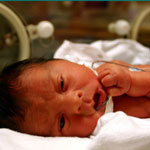Massachusetts Family Agrees to $4.25 Million Birth Injury Settlement
 Parents who claimed that medical malpractice led to their daughter’s cerebral palsy agreed to a brain damage settlement of $4.25 million last week.
Parents who claimed that medical malpractice led to their daughter’s cerebral palsy agreed to a brain damage settlement of $4.25 million last week.
Thomas and Athena Bulger of Auburn, Massachusetts, sued Dr. Robert Berry and two other doctors due to problems during the delivery at the UMass Memorial Center in Worcester, Massachusetts, in August 2010. Their daughter, Gracie, now four years old, suffered brain damage that will prevent her from walking, talking or living independently, according to the Bulger’s attorney.
Cerebral palsy is a disorder of movement, muscle tone or posture that is caused by an injury (such as lack of oxygen) to the immature, developing brain, most often before birth, according to Mayo Clinic.
Failure to perform a C-section quickly enough blamed for injuries
The suit claims Dr. Berry failed to monitor the baby during the last fifty minutes of the two-day labor process. He also allegedly delayed performing a Cesarean section for four hours despite Mrs. Bulger’s demands to have the procedure done. During that last hour, the family’s attorney said the baby’s heart rate began to look troublesome.
After Gracie’s birth, she suffered seizures and imaging studies showed she had brain damage due to lack of oxygen, according to the Bulgers. They contend the injuries happened during the last few hours of labor and could’ve been avoided if the defendants followed different procedures.
The family attorney said the birth injury settlement will be used to pay for therapies for Gracie and to provide for caretakers to look after her for the rest of her life. The case settled before a trial date had been set. A hospital spokesman stated they were involved in the brain damage settlement but would give no further details.
Birth injury settlement covers costs associated with cerebral palsy
The federal Centers for Disease Control and Prevention estimates there is one child born with cerebral palsy for every 250 to 750 births. It’s been estimated that interruption of the oxygen supply during birth is a factor in approximately 6% of spastic cerebral palsy cases.
Cerebral palsy causes impaired movement associated with exaggerated reflexes, floppiness or rigidity of the limbs and trunk, abnormal posture, involuntary movements, unsteadiness of walking or some combination thereof.
People with cerebral palsy may have difficulty with swallowing, commonly have eye muscle imbalance and may have reduced range of motion at various joints of their bodies due to muscle stiffness.
The effects of cerebral palsy on functional abilities can vary greatly. There may be great, or little, impact on walking and intellectual function. Epilepsy, blindness or deafness also may be present. People with cerebral palsy often have underlying developmental brain abnormalities.
Those with cerebral palsy need to be treated by a team of specialists addressing different needs. Medications that can lessen the tightness of muscles may be used to improve functional abilities, treat pain and manage complications related to spasticity or other cerebral palsy symptoms. Nondrug therapies, such as physical, occupational and speech therapies may also be used. Surgery may be needed to lessen muscle tightness or correct bone abnormalities caused by spasticity.


